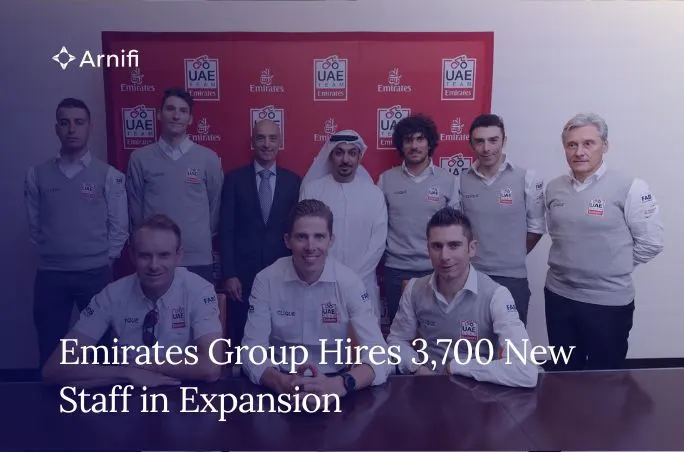Emirates Group Hires Over 3,700 Employees Amid Strong Aviation Sector Recovery
by Ishika Bhandari Nov 11, 2025  8 MIN READ
8 MIN READ

Table of contents
In very evident signs of strong belief in the global aviation and travel industries, Emirates Group announced adding more than 3700 employees to its workforce for the first half of the 2025-26 financial year; according to the Dubai-based company’s mid-year results for the period ended September 30, 2025, total employee numbers had reached 124,927 by late March, a net increase of 3,704- about a 3 percent growth-from 121,223.
Thus, the employment growth is typical of both Emirates airline and dnata, the sister company that processes and grows the business in strong global demand for air travel. The group stated that it continues to invest significantly in new products, technologies, operations, and employee development, reaffirming its continued focus on safety, customer satisfaction, and operational excellence.
Renewed Momentum in Aviation
Though the last decade was unpredictable in the form of pandemic, supply-chain disruption, fluctuating fuel prices, and global economic uncertainty, the results of Emirates now strongly point towards sustained momentum and a distinct growth phase.
An upsurge in new international traffic demands has given airlines the green light to resume or even create new flight networks, such as the new Airbus A350 fleet for Emirates, which will revamp its current A380 and Boeing 777 services by adding a popular Premium Economy class.
The second driver is Dubai’s continued rise as a global aviation and logistics hub, hub-strategically positioned between East and West and supported by world-class infrastructure, gaining a natural advantage as Emirates and dnata capture global travel flows.
Last but not least, the vast investment in innovative technology and digital transformation within the group has, rather ironically, increased demand for newly required skill sets and added technical roles to the workforce.
Scope of the New Hiring
There was no indication from the company as to how the 3,704 new roles would be distributed. It is evident from the ongoing recruitment campaigns that both Emirates and dnata are expanding across several fronts. Group-open recruitment days have been held in cities across Europe, Asia, Africa, and Oceania, such as London, Vienna, Barcelona, Melbourne, Auckland, Lisbon, and Bucharest, and many more.
Recruitment events and global recruitment campaigns highlight the group’s very open-minded talent-search methodology. Domains cover flight operations, cabin crew, ground handling, engineering, technology, logistics, customer service, and management. There are current opportunities that are announced on the official careers portal of the organization across different specializations, reflecting a clear emphasis on both front-line and technical roles.
A Growing Global Workforce
The rise in employees from 121,223 to 124,927 states the Emirates Group’s confidence in its growth strategy. Leadership has also cemented the fact that the company’s commitment extends beyond simple employee numbers into even greater investment in product, service, innovation, and, of course, into its people.
Group Chairman and Chief Executive Sheikh Ahmed bin Saeed Al Maktoum said both Emirates and dnata made multi-billion-dirham investments to further enhance their offerings, modernize operations through innovation, and fully support employees while delivering the highest levels of customer safety and satisfaction.
Analysts in the industry suggest that such hiring will reflect an increase in capacity and future planning. For example, adding new airplanes to the fleet (Airbus A350s) and major refurbishments of the flagship A380s may indicate that Emirates is already preparing for a period of sustained growth as far as passenger growth is concerned. Although dnata’s growing business is in its cargo and ground-handling operations, this also shows superior demand in the broader areas of aviation services.
Impact on the Labour Market
Within the regional context of the labor market, the UAE Group’s recruitment drive takes on much meaning. The Middle East’s aviation ecosystem is not only a critical employer in the region but also an indicator of the health of the economy’s wider context.
Emirates continues to recruit the post-pandemic industry promises an increase in opportunities across aviation, hospitality, logistics, and tourism. Beyond creating jobs in the UAE, increased employment complements job creation in many related sectors, from airport services and transport to catering and retail.
A strong workforce of the Emirates Group will continue to underpin the service promise. Continuously hiring and training staff worldwide ensures that the company can maintain its hallmark quality of service while gearing up for higher passenger numbers in the next few years.
Challenges of Large-Scale Hiring
While the expansion is a good sign, illusion revisualized in a positive light, scaling up a workforce of this size brings logistical and organizational challenges. Recruitment across multiple regions requires coordination of training standards, visa processes, and regulatory compliance.
Emirates is determined to maintain the quality of service excellence across thousands of new hires, as the airline’s branding revolves around consistency. It should also ensure that its onboarding and training programs can absorb new staff efficiently while preserving culture and safety standards to the best possible degree.
There are external factors that must also be managed. The aviation sector is consistently subject to external factors such as global economic shifts, geopolitical tensions, and potential volatility in fuel prices. In this light, it reflects the need for Emirates to expand with flexibility, which enables the company to adapt to changing conditions in the market while retaining operational resilience.
Strategic Priorities Behind the Recruitment
The nature and speed of its plan to recruit thousands of employees seem to show that Emirates is not only consolidating recovery but is rather seriously preparing for the next growth cycle. The new Airbus A350s, the potential expansion of dnata facilities, and the introduction of digital technologies are all part of a modernisation effort that needs new talent.
Technology has become an integral component of the group, touching everything from predictive maintenance and data analytics to customer experience systems and digital booking tools. This transformation necessitated the introduction of new types of expertise related to software engineering, cybersecurity, and data science, in addition to traditional aviation skills.
Furthermore, with a focus on sustainability, airlines, including more fuel-efficient aircraft and waste reduction strategies, environmental management, and sustainable operations roles, have been added to the recruitment mix.
Career Opportunities and Employee Development
For prospective employees worldwide, the Emirates Group recruitment drive presents an opportunity to join one of the leading aviation organisations worldwide. Open days and the online application portal provided by the company are designed to be accessible for candidates of different backgrounds and levels of experience.
Career progression remains a major focus with the organisation. The group provides structured training, continuous development programmes, and opportunities for internal mobility between Emirates Airlines and dnata. This growth also allows for new pathways into ever-increasing leadership, technical, or customer-facing roles.
For many, the Emirates Group’s attraction is not necessarily job security but rather a very rich workplace of multiculturalism and international exposure, qualities that have made it among the most sought-after employers in the region.
Looking Ahead
The Emirates Group is anticipating that travel demand will remain robust through 2025 and beyond. Delivery of new aircraft, a burgeoning global network, and investments in technology are expected to further enhance operations.
Recruitment is expected to continue through 2026, particularly in areas such as cabin crew, engineering, and technology, in support of integrating the new fleet into expanded routes. Dnata is also likely to increase ground handling and cargo operations at airports around the globe, thus creating further opportunities.
Sustainability and digital transformation remain at the centre of the company’s recently unveiled recruitment strategy, combining the classical aviation roles with the new-generation skills in automation, AI, and data-driven operations.
Conclusion
The addition of more than 3,700 new employees by the Emirates Group in the first half of 2025-26 is a clear expression of its faith in its own growth path, along with that of the resilience of the global aviation industry. The group presently has, in total, around 125,000 people to whom it continues to invest, believing them to be the core of its success.
For the UAE, this act symbolizes the nation being at the very top in aviation and employment. For Emirates and dnata, this indicates just another forward step toward sustained global growth, better customer service, and operational innovations.
While changes are constantly taking place in the aviation world, the Emirates Group’s strategies maintain their recognition of one constant: success in the skies begins on the ground, with the skillful, motivated, and empowered personnel who are indeed the real engine of growth.
Top UAE Packages

Related Articles
Top UAE Packages



